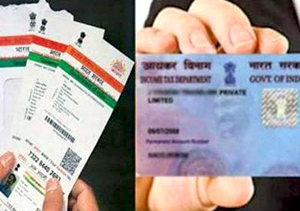New Delhi, Jun 1: The Income Tax Department on Wednesday urged taxpayers to link their Aadhaar with their PAN, using an SMS-based facility.
The department issued advertisements in leading national dailies and described how both the unique identity numbers of an individual can be linked by sending an SMS to either 567678 or 56161.
It said people can also visit the official efiling website of the department to link the two identities, in both the cases-- identical names in the two databases or in case where there is a minor mismatch.
It said linking the two numbers is the key to "seamlessly avail online, a world of income tax facilities."
"Aadhaar can also be seeded into PAN database by quoting Aadhaar in PAN application form for new PAN allotment or by quoting Aadhaar in change request form used for reprint of PAN card," it said in the advertisement.
The Income-Tax-department had early this month launched a new e-facility to link a person's Aadhaar with the Permanent Account Number (PAN), a mandatory procedure for filing I-T returns now.
The department's e-filing website has hosted a new link on its homepage to link the two unique identities.
The link requires a person to punch in his PAN number, Aadhaar number and the exact name as given in the Aadhaar card.
"After verification from the UIDAI (Unique Identification Authority of India), the linking will be confirmed.
"In case of any minor mismatch in Aadhaar name provided, Aadhaar OTP (one time password) will be required," the department had said in its advisory to taxpayers and individuals.
The OTP will be sent on the registered mobile number in the Aadhaar database.
The government, under the Finance Act 2017, has made it mandatory for taxpayers to quote Aadhaar or enrolment ID of Aadhaar application form for filing of Income-Tax returns (ITR).
Also, Aadhaar has been made mandatory for applying for permanent account number with effect from July 1, 2017.
While Aadhaar is issued by the UIDAI to a resident of India, PAN is a ten-digit alphanumeric number issued in the form of a laminated card by the I-T department to any person, firm or entity.





Comments
Add new comment